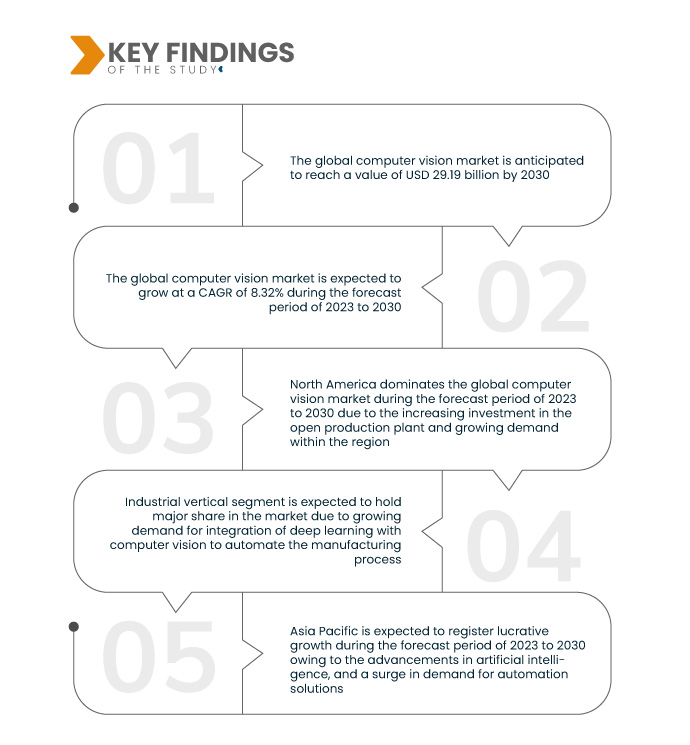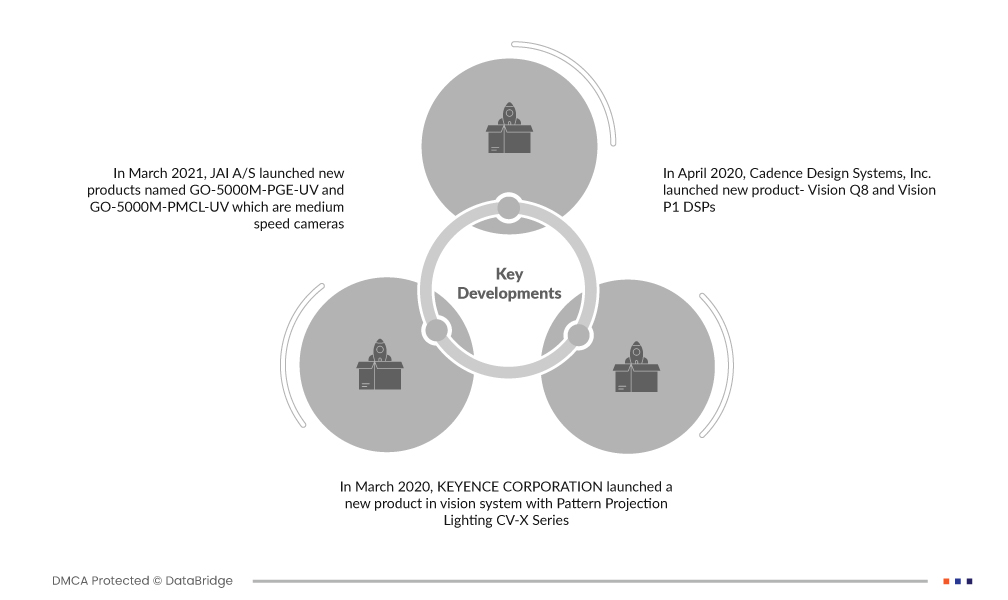La visión por computadora, un subconjunto de la inteligencia artificial, emplea modelos de aprendizaje profundo para interpretar objetos del mundo real a través de imágenes y videos digitales. Este proceso implica adquirir, procesar y analizar datos para identificar, detectar y clasificar objetos. Implementado en todos los sectores, facilita aplicaciones como la detección de objetos, reconocimiento facialy detección de patrones. Al entrenar a las computadoras para que comprendan elementos visuales, la visión por computadora revoluciona las respuestas y los resultados, mejorando su utilidad en diversos campos.
Acceder al informe completo @ https://www.databridgemarketresearch.com/reports/global-computer-vision-market
Data Bridge Market Research analiza que el Mercado mundial de visión por computadora estaba valorada en 12,98 mil millones de dólares en 2022 y se espera que alcance los 29,19 mil millones de dólares en 2030, registrando una tasa compuesta anual del 8,32% durante el período previsto de 2023 a 2030. La sinergia entre la visión por computadora y los dispositivos de IoT impulsa el crecimiento del mercado. A medida que los sensores de IoT generan una gran cantidad de datos, la integración de la visión por computadora se vuelve fundamental, extrayendo información significativa. Esta asociación dinámica mejora las capacidades de análisis de datos, fomentando la innovación y la eficiencia en todas las industrias que dependen del Internet de las cosas.
Hallazgos clave del estudio
La precisión y confiabilidad que ofrecen los sistemas de visión por computadora para la detección y clasificación de imágenes en todo el mundo impulsarán la tasa de crecimiento del mercado.
Las capacidades de detección temprana de la visión por computadora, que identifican células cancerosas, fracturas y obstrucciones de los vasos cardíacos, ofrecen importantes beneficios a los pacientes. El reconocimiento preciso de rostros humanos extiende su utilidad a lugares de trabajo, portales de pago y seguridad aeroportuaria. Además, en el ámbito policial, agiliza la verificación de sujetos para la policía. La confiabilidad, exactitud y precisión de la tecnología en la detección de objetos impulsan su implementación en diversos sectores, contribuyendo al rápido crecimiento del mercado de la visión por computadora.
Alcance del informe y segmentación del mercado
|
Métrica de informe
|
Detalles
|
|
Período de pronóstico
|
2023 a 2030
|
|
Año base
|
2022
|
|
Años históricos
|
2021 (Personalizable para 2015-2020)
|
|
Unidades Cuantitativas
|
Ingresos en miles de millones de dólares, volúmenes en unidades, precios en dólares
|
|
Segmentos cubiertos
|
Componentes (hardware, software, servicio), producto (sistemas de visión por computadora basados en cámaras inteligentes, sistemas de visión por computadora basados en PC), oferta (aprendizaje profundo, visión por computadora tradicional), aplicación (garantía de calidad e inspección, posicionamiento y orientación, identificación, Mantenimiento predictivo), Vertical (Industrial, No Industrial)
|
|
Países cubiertos
|
EE.UU., Canadá, México, Brasil, Argentina, Resto de Sudamérica, Alemania, Italia, Reino Unido, Francia, España, Países Bajos, Bélgica, Suiza, Turquía, Rusia, Resto de Europa, Japón, China, India, Corea del Sur, Australia, Singapur, Malasia, Tailandia, Indonesia, Filipinas, Resto de Asia-Pacífico, Arabia Saudita, Emiratos Árabes Unidos, Sudáfrica, Egipto, Israel, Resto de Medio Oriente y África
|
|
Actores del mercado cubiertos
|
Cognex Corporation (EE.UU.), Basler AG (Alemania), Omron Corporation (Japón), KEYENCE CORPORATION (Japón), National Instruments Corp (EE.UU.), Sony Corporation (Japón), Teledyne (EE.UU.), Allied Vision Technologies GmbH (Alemania), Texas Instruments Incorporated (EE.UU.), Intel Corporation (EE.UU.), Baumer (Alemania), JAI (Dinamarca), MediaTek, Inc. (Taiwán), Cadence Design Systems, Inc. (EE.UU.), CEVA, Inc. (EE.UU.) y Synopsys, Inc. (EE. UU.)
|
|
Puntos de datos cubiertos en el informe
|
Además de la información sobre escenarios de mercado como el valor de mercado, la tasa de crecimiento, la segmentación, la cobertura geográfica y los principales actores, los informes de mercado seleccionados por Data Bridge Market Research también incluyen análisis de expertos en profundidad, producción de empresas representadas geográficamente y capacidad, diseños de red de distribuidores y socios, análisis detallado y actualizado de tendencias de precios y análisis de déficit de la cadena de suministro y la demanda.
|
Análisis de segmentos:
El mercado global de visión por computadora está segmentado según los componentes, el producto, la oferta, la aplicación y la vertical.
- Según los componentes, el mercado mundial de la visión por computadora se segmenta en hardware, software y servicios. Se espera que el segmento de hardware tenga una participación importante en el mercado con un 57,9% de participación de mercado debido a factores como la creciente adaptación a la IA utilizando sistemas de visión por computadora y la creciente demanda de realidad aumentada en diversas industrias, lo que está impulsando el despliegue de electrónica avanzada como cámara, sensor, óptica e iluminación LED
- Según el producto, el mercado mundial de visión por computadora se ha segmentado en sistemas de visión por computadora basados en cámaras inteligentes y sistemas de visión por computadora basados en PC. Se espera que el segmento de sistemas de visión por computadora basados en cámaras inteligentes tenga la mayor participación en el mercado con una participación de mercado del 52,49% debido a factores como la creciente demanda de sistemas inteligentes.
ElEl segmento de sistemas de visión por computadora basados en cámaras inteligentes dominará el segmento de productos del mercado global de visión por computadora.
Se espera que el segmento de sistemas de visión por computadora basados en cámaras inteligentes tenga la mayor participación en el mercado con un 52,49% de participación de mercado debido a factores como la creciente demanda de sistemas inteligentes con la ayuda de IA y sistemas de visión por computadora basados en aprendizaje profundo, lo que demuestra ser Altamente exacto y preciso en la toma de decisiones.
- Según la oferta, el mercado global de visión por computadora se ha segmentado en aprendizaje profundo, visión por computadora tradicional
- Sobre la base de la aplicación, el mercado mundial de la visión por computadora se ha segmentado en mantenimiento predictivo, identificación, posicionamiento y orientación, y control e inspección de calidad. Se espera que el segmento de inspección y control de calidad tenga la participación máxima en el mercado con una participación de mercado del 37,87% debido a factores como la creciente demanda de detección de objetos, clasificación, detección de errores y detección de defectos, entre otros, en diversas industrias como la automotriz y la manufacturera. , asistencia sanitaria entre otros
- Sobre la base de la vertical, el mercado mundial de visión por computadora se ha segmentado en vertical industrial y vertical no industrial. Se espera que el segmento vertical industrial tenga la mayor participación en el mercado con una participación de mercado del 51,68% debido a la creciente demanda de integración del aprendizaje profundo con la visión por computadora para automatizar el proceso de fabricación.
ElEl segmento vertical industrial dominará el segmento vertical del mercado global de visión por computadora.
Se espera que el segmento vertical industrial tenga la mayor participación en el mercado con una participación de mercado del 51,68% debido a la creciente demanda de integración del aprendizaje profundo con visión por computadora para automatizar el proceso de fabricación que puede usarse para la detección de objetos, suavizando el proceso de fabricación, error. detección, detección de defectos entre otros en diversas industrias como la automotriz, manufacturera, electrónica de consumo entre otras.
Principales actores
Data Bridge Market Research reconoce que las siguientes empresas como los principales actores del mercado mundial de visión por computadora son Texas Instruments Incorporated (EE. UU.), Intel Corporation (EE. UU.), Baumer (Alemania), JAI (Dinamarca), MediaTek, Inc. ( Taiwán), Cadence Design Systems, Inc. (EE. UU.), CEVA, Inc. (EE. UU.) y Synopsys, Inc. (EE. UU.)
Desarrollos del mercado
- En marzo de 2021, JAI A/S lanzó nuevos productos denominados GO-5000M-PGE-UV y GO-5000M-PMCL-UV, que son cámaras de velocidad media. Estos productos pueden ofrecer imágenes con una resolución de 5 megapíxeles y cuadros por segundo de 22 a 107 fps. Se pueden utilizar para la calibración del láser UV y la inspección de superficies de metales y plásticos, entre otros. Estos productos se pueden implementar en diversas industrias para obtener resoluciones de alta calidad.
- En marzo de 2020, KEYENCE CORPORATION lanzó un nuevo producto en sistema de visión con Pattern Projection Lighting Serie CV-X que es capaz de un sistema de visión de inspección 2D, extracción de altura e inspección 3D, entre otros. El controlador de visión lo alimenta. Era un producto único que puede inspeccionar y analizar los defectos y ser ampliamente utilizado en las empresas de automóviles. Es un gran activo para la empresa por su fiabilidad en la detección de fallos.
- En abril de 2020, Cadence Design Systems, Inc. lanzó un nuevo producto: los DSP Vision Q8 y Vision P1. Esto se hizo para respaldar la creciente demanda en los sectores automotriz, móvil y de consumo. Como estos modelos se optimizaron para aplicaciones automotrices móviles y multicámara de alta gama, los productos mejoraron su rendimiento 4 veces. La empresa hizo esto para ampliar su cartera de productos y ofrecer productos confiables a los consumidores.
Análisis Regional
Geográficamente, los países cubiertos en el informe del mercado global de visión por computadora son EE. UU., Canadá, México, Brasil, Argentina, resto de América del Sur, Alemania, Italia, Reino Unido, Francia, España, Países Bajos, Bélgica, Suiza, Turquía, Rusia, resto de Europa, Japón, China, India, Corea del Sur, Australia, Singapur, Malasia, Tailandia, Indonesia, Filipinas, Resto de Asia-Pacífico, Arabia Saudita, Emiratos Árabes Unidos, Sudáfrica, Egipto, Israel, Resto de Medio Oriente y África
Según el análisis de investigación de mercado de Data Bridge:
América del Norte es la región dominante en el global mercado de visión por computadora durante el período de previsión 2023-2030
América del Norte domina el mercado mundial de la visión por computadora, impulsado por importantes inversiones en plantas de producción abiertas. La región experimenta una mayor demanda de restaurantes y cafés/bares de servicio completo, lo que contribuye a su supremacía en el mercado. A medida que estas industrias adoptan cada vez más tecnologías de visión por computadora para lograr eficiencia e innovación, América del Norte se erige como un impulsor clave en la configuración de la trayectoria del mercado global de visión por computadora.
Se estima que Asia-Pacífico es la región de más rápido crecimiento a nivel mundial mercado de visión por computadora para el período de previsión 2023-2030
Se espera que Asia-Pacífico domine el mercado mundial de visión por computadora durante el período previsto de 2023 a 2030. Con florecientes avances tecnológicos y una mayor adopción de la visión por computadora en diversas industrias en países como China e India, la región anticipa un crecimiento sustancial del mercado. Las crecientes inversiones en investigación y desarrollo, junto con una creciente demanda de automatización, posicionan a Asia-Pacífico como un actor clave en la configuración de la trayectoria del mercado mundial de visión por computadora en los próximos años.
Para obtener información más detallada sobre el mundo mercado de visión por computadora informe, haga clic aquí –https://www.databridgemarketresearch.com/reports/global-computer-vision-market














